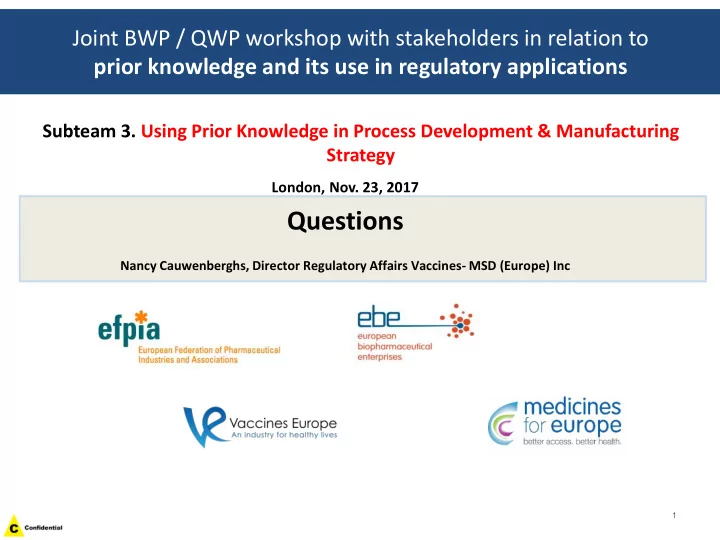

Joint BWP / QWP workshop with stakeholders in relation to prior knowledge and its use in regulatory applications Subteam 3. Using Prior Knowledge in Process Development & Manufacturing Strategy London, Nov. 23, 2017 Questions Nancy Cauwenberghs, Director Regulatory Affairs Vaccines- MSD (Europe) Inc 1
Process Development Session Part I (25 min) • Regulators Viewpoint (Dr. Sean Barry)-15min • General Considerations, including small molecules considerations -10min Part II (30 min) 3 Case Studies: 10 min each • Prior Knowledge to optimize process characterization approaches, mAb (Amgen) • Prior knowledge to optimize process validation approaches , mAb (Roche) • Prior knowledge to streamline viral safety and resin lifetime studies (mAb and vaccine, EBE viral safety consortium & MSD) Part III (30 min) Q&A linked to case studies – 10 min General Q&A and discussion – 20 min
PROCESS DESIGN AND DEVELOPMENT – QUESTION Resin lifetime - Monoclonal Antibody Case Study Monoclonal Antibody Case Study Use of Prior Knowledge on Affinity Capture Use of Prior Knowledge for small virus filters to Resins to support resin age evaluation criteria support testing of worst case small virus in lieu of large viruses Gain Health Authority approval based on modelling of reuse performance from existing mAbs verified Nano-filtration for parvovirus filters through a cross validation with limited data from an actual mAb. In addition a concurrent process – test worst case small virus; and remove product- verification at scale under the company specific large virus clearance studies Pharmaceutical Quality System (PQS) is performed. – once a nano-filter has been determined insensitive Resin lifetime - Vaccines Case Study to process interruption, this parameter is not tested in later virus clearance studies Use of Prior Knowledge to Support Resin Reuse Across Vaccine Serotypes (chromatography Aged Protein A resins step) – measuring virus LRV using multi-cycled resin on a Gain Health Authority approval based on the prior product-by-product basis may be obviated knowledge, supplemented with data derived from the small scale model to use resin across serotypes but, still dedicated to a specific product, and monitor the performance at scale under the company Pharmaceutical Quality System (PQS). Can these approaches be acceptable ? 3
PROCESS DESIGN AND DEVELOPMENT – QUESTION Cont’d How to leverage prior knowledge to enable accelerated and/or more efficient process validation ? • Use of prior process knowledge to optimize validation approach and criticalities • Proposal to reduce/eliminate PV studies where assessment of variability is not important; i.e. clearance of impurities with significant excess capability • Apply prior knowledge and strategies to establish PV acceptance criteria, i.e. move to more generic CQA control points/sample plan, platform quality requirements and variability estimates for process validation criteria • Develop risk-based stage 1/2 PV strategy and leveraging post-approval stage 3 PV plans • Combine phase III pivotal and PPQ campaigns • Assess/justify # PV lots and streamline post-validation strategy based on overall knowledge of process, technology, facility and risks • Extensive prior knowledge be justified as ‘standard’ manufacturing technology (eg aseptic filling, leachables/extractables) 4
Recommend
More recommend